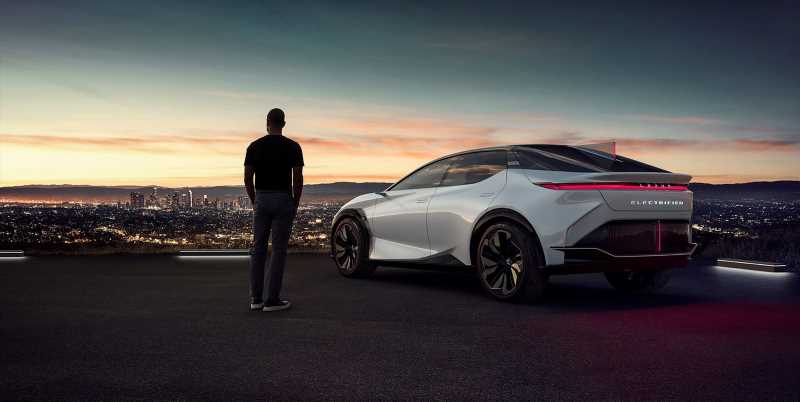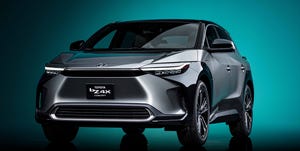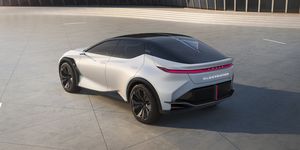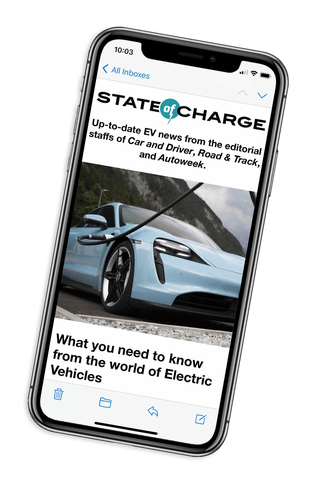Long noted for being a plug-in hybrid and EV holdout until fairly recently, Lexus confirmed that it will launch its first dedicated battery-electric vehicle in 2022, after rolling out its first mass-market plug-in hybrid electric vehicle (PHEV) later this year. The luxury wing of Toyota—which has also been a notable skeptic on EVs but a pioneer of hybrids—Lexus currently offers just one battery-electric model. The Lexus UX 300e is sold in Europe, but it happens to be a reworking of a gas-engined model. Next year that will change when the automaker offers an EV designed from the ground up to be battery-electric.
Lexus previewed just what its next EV will look like with the LF-Z Electrified concept earlier this spring, giving the world a thinly disguised look at a future crossover whose platform will be shared with a Toyota EV model due on sale later this year. Perhaps to no one’s surprise, the LF-Z concept previewed a midsize crossover with a rakish profile, one that’s likely to gain some height and cargo space for its production debut.
Lexus also shared some longer-term plans in announcing the arrival of its next EV in 2022.
“By 2025, Lexus will introduce 20 new or improved models, including more than 10 BEVs, PHEVs and HEVs,” the automaker said. “That year is also the target for the brand to offer electrified vehicle options across the entire Lexus product range. The future expectation is that the sales of electrified models will exceed that of the pure-petrol variety. In addition, by 2050, Lexus will achieve carbon neutrality throughout the entire vehicle lifecycle, such as materials, parts, and vehicle manufacturing, along with logistics, driving, and disposal/recycling.”
It’s worth noting at this point that Lexus counts hybrids as “electrified” models, so the share of battery-electric vehicles in this tally may not be as sprawling as it sounds. So Lexus and Toyota will be taking very measured steps in the direction of EVs, and will not be transitioning away from hybrids as quickly as some EV enthusiasts would like. This means that we’re not likely to see as quick an expansion of Lexus’ EV fleet as that currently planned by rivals Mercedes and BMW, which have EVs in the works to cover just about every major segment. Lexus is expected to take a slightly different path, one that will start with an obvious crowd-pleaser of a crossover.
Lexus’ approach is conservative, of course, but also mindful of markets that are not seeing as much EV adoption as northern Europe or China.
When it comes to plug-in hybrids, the automaker has also been careful with its U.S. offerings, and like its upcoming BEV model it’s likely to be offered in a crossover. That crossover is expected to be the Lexus NX, itself up for a redesign quite soon, with the 2022 arriving later this year.
At this point you’ve probably noticed that Lexus’ immediate EV and PHEV plans do not include sedans, and they do not include larger models like the LX or the GX. And they certainly do not include the LS flagship. Among other things, this demonstrates that Lexus expects BEV buyers to head for the best-selling segments of the moment, which are midsize and compact crossovers, rather than fielding a competitor to the Mercedes EQS or the Tesla Model S. This means it could be quite some time before we see a Lexus LS that’s battery electric, and longer yet before we see a large sport utility like the Land Cruiser-based LX.
SIGN UP
“Lexus aims to offer electric variants of all its models by 2025, with the sales ratio of electric vehicles exceeding that of gasoline-engine vehicles,” the automaker adds. “By 2050, Lexus aims to achieve carbon neutrality throughout the lifecycle of its entire model lineup—from the manufacturing of materials, parts, and vehicles, to vehicle logistics, to the final disposal and recycling of older vehicles. In this perspective, and with a clear mission to achieve carbon neutrality, Lexus will reduce the environmental impact of materials’ manufacturing processes.”
Lexus certainly seems to be prudently targeting segments that are low-hanging fruit, instead of trying to dazzle its customer base with a six-figure luxury sedan. That’s an approach that contrasts with Mercedes and BMW at the moment, which are busy plotting EV models for every major segment, and are arguably taking far bigger risks.
In what segment should Lexus’ second EV land? Let us know in the comments below.
Source: Read Full Article




